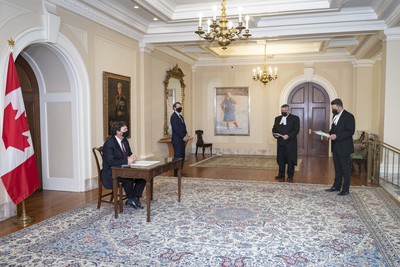Tristin Hopper
May 10, 2021
-National Post
It may have escaped widescale notice what with the pandemic and all, but Canada hasn’t had a governor general since the Jan. 23 resignation of Julie Payette. For more than three months, the military hasn’t had a commander-in-chief and the duties of being Canada’s principle “democratic safeguard” have been handed over to a part-time temp.
Below, a quick guide to how Canada is faring despite nobody technically being in charge anymore.
Materially, the government is working about the same … for now
According to the 1947 letter signed by King George VI that lays out the duties of the Canadian governor general, if Rideau Hall suddenly finds itself without an occupant, their job is automatically handed over to the Chief Justice of the Supreme Court. Thus, ever since January, Chief Justice Richard Wagner has been needing to pull extra hours at the office as the new Administrator of the Government of Canada.
Rideau Hall is now being operated on what could best be described as a “work to rule” basis. Wagner is accepting the credentials of foreign diplomats and inking royal assent on new laws and orders-in-council, but he’s not bothering with any of the extra stuff like medal ceremonies, commemorating Asian Heritage Month or writing letters to Canadians who turn 100.
Canada has been run by administrators plenty of times before, most notably after the deaths in office of Georges Vanier and Lord Tweedsmuir. Nevertheless, we are fast approaching the longest-ever stretch of governor general-less governance in our history: The only real contender is an eight-month period in 1974 where then-Governor General Jules Léger had to hand off his duties while recovering from a stroke.
Where it might get iffy for the administrator is if a snap election breaks out, which isn’t completely off the table given that Canada currently has a minority government. Governors general usually don’t have to use their discretion at election time; all they have to do is follow the prime ministers’ request to dissolve Parliament and then a few weeks later they swear in the winner.
The Administrator could do this just as well as anybody, but should an election yield a hung parliament of competing coalitions, Canada could be thrust into the unusual situation of having our Chief Justice deciding who gets to be prime minister.The most noticeable effect is in the diplomatic realm
Governors general spend a lot of their time making nice with foreign countries and attending overseas events. Just in the last 20 years, the governor general has morphed from a figure who barely left Ottawa into one who is making a foreign visit roughly every six weeks. In 2019, for instance, Julie Payette made 12 foreign visits, including being Canada’s representative at the Rwandan commemoration of its 1994 genocide, marking a Second World War anniversary in Italy, attending the Pan American Games in Peru and showing up for the funeral of French president Jacques Chirac.
As royal commentator Richard Berthelsen told the National Post, none of these foreign trips are the governor general’s idea: They all come at the request of the prime minister. Sending the governor general is a great way for prime ministers to avoid the more tedious ceremonial demands of high office. Plus, since the governor general is a higher-ranked public official than the prime minister, there are governments who prefer the prestige of a visiting Crown representative.
COVID-19 has put a halt to most diplomatic gatherings, so it’s unlikely many are noticing that Canada is without its “diplomat-in-chief.” Still, there have been signs, such as Canada sending a military attaché to the funeral of Prince Philip.
As the world begins to open up, a Canada without a governor general would mean lots of empty chairs, ignored international invites and unwelcomed diplomats — not to mention the usual round of ribbon-cuttings and military parades that the governor general does domestically. Said Berthelsen, “are we just going to abandon civil society and say ‘you have the prime minister and if you don’t like the prime minister you’re out of luck?’ Our country doesn’t work that way.”
First Nations are not tremendously pleased with the current vacancy
In January, the Confederacy of Treaty Six First Nations — a coalition of First Nations in central Alberta and Saskatchewan — drafted an official letter to Buckingham Palace expressing their alarm at the lack of an officially designated Crown representative in Ottawa.
It’s not unusual to see First Nations contacting Rideau Hall directly regarding treaty matters. Most of Canada sits on treaties that were struck with the Crown, and many First Nations hold the view that while these initial contracts were good faith nation-to-nation agreements, they’ve been sullied under the devolved management of successful generations of Canadian authorities. At the height of Idle No More protests in 2013, for instance, Attawapiskat Chief Theresa Spence declined a meeting with Prime Minister Stephen Harper unless the governor general would also be present.




